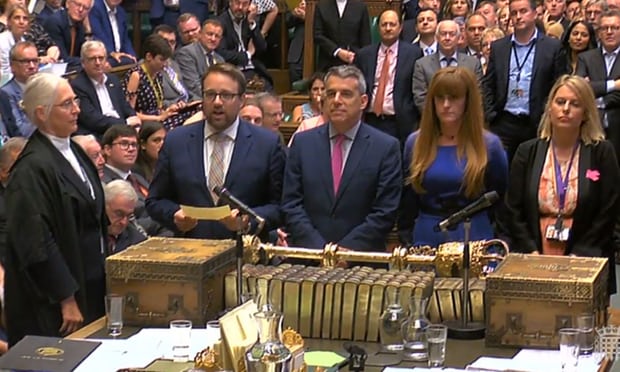.
The moment of Brexit decision has shifted yet again – closer and closer to default crash out of the EU on 29 March. Theresa May has confirmed that plan B is plan A – basically the deal that was so massively rejected a week ago. But the dynamics have changed.
Next Monday she will move a neutral motion to the Withdrawal Bill taking note of her statement today. This will allow amendments to be moved with alternative proposals for debate over the following several days. The binary monopoly of My Deal or No Deal has been shattered.
Although it has been said before more than once, D for decision Day cannot long be delayed. Among them is a new Labour amendment in Jeremy Corbyn’s name which allows a vote for either Labour’s plan for a customs union, or the option he has resisted – a second referendum. This will raise the chances for a second referendum but without committing the leadership at this stage to support it .
As “taking No Deal off the table” is a cross-party priority, former Labour minister Yvette Cooper’s amendment crafted by Nick Boles would delay Article 50, thereby averting No Deal at the end of March. The Cooper amendment would ensure there’s Commons time for MPs to debate a bill instructing the government to table a motion extending Article 50 until the end of the year if agreement cannot be reached by a specified date.
But behind the mere shift of date, Mrs May suspects the real motive is to kill Brexit, so she is opposing it, at least until she has a final bash at pushing Brussels into concessions on the backstop.
Both main parties are split. There will be a tug of war between Conservative and Labour Remainers on one side and on the other, Conservative loyalists and Conservative and Labour Brexiteers squeezed into accepting the withdrawal agreement when the alternatives are either a soft Brexit or a second referendum.
The anti-Brexiteers will need to be careful to avoid splitting and letting Mrs May’s deal win by default. That’s what Mrs May is hoping for. Much depends which among several amendments will be chosen by the Speaker who has been written off by the government as pro-Remain.
Rather than duck it any longer. Mrs May has been forced to accept the Remain challenge at last. Armed with the result of the votes, she will go back to Brussels and demand their final offer –along the lines of Leo Varadkar’s musings perhaps, or hoping against hope for a limitation on the backstop- (and incidentally having ruled ruling out any idea of renegotiating the GFA, an idea her negotiator Ollie Robbins urged her not to put, according to the Daily Telegraph).
She will rely mainly on how she staked out her position today.
She said: “There is widespread concern about the possibility of the UK leaving without a deal. And there are those on both sides of the House who want the government to rule this out.
“But we need to be honest with the British people about what that means. The right way to rule out no deal is for this House to approve a deal with the European Union. That is what this government is seeking to achieve.”
She said cancelling Article 50 was the only way of ensuring what Ms Cooper wants: “The only other guaranteed way to avoid a no-deal Brexit is to revoke Article 50, which would mean staying in the EU. There are others who think that what we need is more time, so they say we should extend Article 50 to give longer for parliament to debate how we should leave and what a deal should look like.
“This is not ruling out no deal, but simply deferring the point of decision. And the EU are very unlikely simply to agree to extend Article 50 without a plan for how we are going approve a deal.
“So when people say ‘rule out no deal’ the consequences of what they are actually saying are that if we in parliament can’t approve a deal we should revoke Article 50. I believe this would go against the referendum result and I do not believe that is a course of action that we should take, or which this House should support.”
But Mrs May will not be able to impose her own position on the party or even her government. Adding dramatically to the pressure on her, Amber Rudd has thrown a grenade at May’s top priority of holding her party together to demand free votes on the amendments. Rudd or “friends” told the Times she warned No 10 that it could face dozens of ministerial resignations next week if Tory MPs are banned from voting for a plan that helps stop a no-deal Brexit.
The work and pensions secretary believes that 25 to 40 members of the government want to vote for an amendment drafted by Labour’s Yvette Cooper and the Tory backbenchers Sir Oliver Letwin and Nick Boles. A rather larger number of Labour MPs are likely to support the government rather than a second referendum.
The balance of decision appears to rest with Labour MPs. It’s too soon to try to call the result. But it will be closer than last time. The consolation is that it looks as if a hard border will be avoided, whoever wins.
Former BBC journalist and manager in Belfast, Manchester and London, Editor Spolight; Political Editor BBC NI; Current Affairs Commissioning editor BBC Radio 4; Editor Political and Parliamentary Programmes, BBC Westminster; former London Editor Belfast Telegraph. Hon Senior Research Fellow, The Constitution Unit, Univ Coll. London
Discover more from Slugger O'Toole
Subscribe to get the latest posts to your email.
